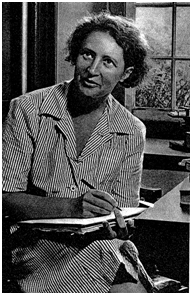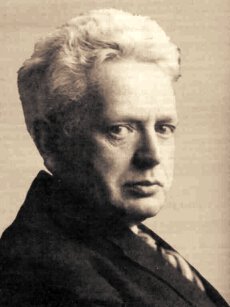
AnthonyFlood.com
Philosophy against Misosophy


Preface, dated November 1, 1945, to Ernst Cassirer, Language and Myth, translated by Susanne K. Langer, Harper & Row, 1946 [Dover Publications paperback, 1953], vii-x.
Language, “man’s prime instrument of reason, reflects his mythmaking tendency more than his rationalizing tendency.”
For a fuller treatment of the topic, see her “On Cassirer’s Theory of Language and Myth.” See also Chapter 6 of Language and Myth, “The Power of Metaphor.”
Posted August 20, 2008
Ernst Cassirer’s
Language and Myth
Susanne K. Langer
Twenty-two years ago [1923], Ernst Cassirer pub-lished the first volume of a work which struck a new note in so-called “theory of knowledge.” It was called Die Philosophie der Symbolischen Formen (The Philosophy of Symbolic Forms). In this work, the “theory of knowledge” became a theory of mental activity, which gave as minute and scholarly atten-tion to the forms of feeling and imagination as to the categories of sense perception and logic.
The book has not yet [as of 1945*--A.F.] been translated into English; the only access we have to his ideas, therefore, is his recent small volume, An Essay on Man, which presents his main conclusions in brief résumé. But to be presented with a thinker’s conclusions, not really seeing the path whereby he reached them, or knowing the first suggestion—the insight or naïve perception—which opened that path, is unsatisfactory to anyone whose philosophical interest is more than skin deep.
Now unfortunately, at the time when Professor Cassirer was engrossed in the first half of his great work—tracing the story of human mentality before the birth of that rather abstract form of conception which we call “logic”—he wrote a short but faithful account of his growing idea, his theory of myth and language. This little study, Sprache und Mythos, reveals the genesis of some of those great conclusions for which he is known to the world; it gives one a look into the mental laboratory where new ideas are generated and developed.
Americans like to look into laboratories, especially when they know that something big is in the making there. So this philosophical fragment which prepares a whole world view is here presented to the English-speaking public, for the same reason that the Bibliothek Warburg (one of the world’s great ventures in popular education) saw fit to publish it originally.
But an expert in his sanctum sometimes appears to make strange moves, unless we know what he is trying to do. A layman seriously watching him may well appreciate a tip to that effect from some fellow worker in the place. Therefore I may be permitted to point out in advance what Professor Cassirer was undertaking, and how he proposed to do it.
He was originally struck with the fact that the “theory of knowledge,” as philosophers had devel-oped it since the Middle Ages, concerned itself solely with the appreciation of “facts” and the development of orderly thought about facts. The inveterate belief of all mankind in myth, sometimes crystallized into dogmas, sometimes degraded into superstition, was always excluded from the field of philosophical interest, either as divine revelation, which philosophy could not touch, or (especially in modern times) as a miscarriage of logical explanation, a production of ignorance. But the whole realm of mythical concepts is too great a phenomenon to be accounted for as a “mistake” due to the absence of logically recorded facts. Mere ignorance should be agnostic—empty and negative—not exciting and irrepressible. And it dawned on the philosopher that theory of mind might well begin not with the analysis of knowledge, but with a search for the reason and spiritual function of this peculiar sort of “ignorance.”
Here he was helped by a stroke of insight: the realization that language, man’s prime instrument of reason, reflects his mythmaking tendency more than his rationalizing tendency. Language, the symboliza-tion of thought, exhibits two entirely different modes of thought. Yet in both modes the mind is powerful and creative. It expresses itself in different forms, one of which is discursive logic, the other creative imagination.
Human intelligence begins with conception, the prime mental activity; the process of conception always culminates in symbolic expression. A concep-tion is fixed and held only when it has been embodied in a symbol. So the study of symbolic forms offers a key to the forms of human conception. The genesis of symbolic forms—verbal, religious, artistic, mathe-matical, or whatever modes of expression there be—is the odyssey of the mind.
The two oldest of these modes seem to be language and myth. Since both are of prehistoric birth, we cannot fix the age of either; but there are many reasons for regarding them as twin creatures. The intuitions about nature and man reflected in the oldest verbal roots, and the processes by which language probably grew up are the same elementary intuitions and the same processes which are expressed in the development of myths. They are not the categories and canons of so-called “discursive logic,” the forms of reason, which underlie both common sense and science. Reason is not man’s primitive endowment, but his achieve-ment. The seeds of it—fertile, yet long dormant—lie in language; logic springs from language when that greatest of symbolic modes is mature (as it is by the time we meet it in history or ethnology).
Myth never breaks out of the magic circle of its figurative ideas. It reaches religious and poetic heights; but the gulf between its conceptions and those of science never narrows the least bit. But language, born in that same magic circle, has the power to break its bounds; language takes us from the mythmaking phase of human mentality to the phase of logical thought and the conception of facts.
Theory of knowledge has always treated this final achievement as man’s natural and primitive way of thinking, and taken “facts” as his earliest stock in trade. Consequently, it could find no connection at all between myth and truth, poetry and common sense, religion and science; most of man’s actual ideas, most of his cultural and spiritual background, had to be discounted as error, caprice, or emotional indulgence. Professor Cassirer’s great thesis, based on the evidence of language and verified by his sources with quite thrilling success, is that philosophy of mind involves much more than a theory of knowledge; it involves a theory of prelogical conception and expression, and their final culmination in reason and factual knowledge.
Such a view changes our whole picture of human mentality. The following pages give the reader the high lights of significant fact which suggested, supported, and finally clinched the theory. I offer the translation of this little study (with some slight modifications and abridgments made by the author shortly before his death) both as a statement of a new philosophical insight and as a revelation of the philosopher’s work: his material, his technique, and the solution of the problem by a final flash of interpretive genius.
* Yale University Press published Ralph Manheim’s English translations of Volumes I, II, and III in 1953, 1955, and 1957 respectively, and John Michael Krois’ translation of Volume IV in 1996, the manuscript of which he and Donald Phillip Verene prepared from drafts that Cassirer left at his death in 1945. -- A.F.
Langer main page